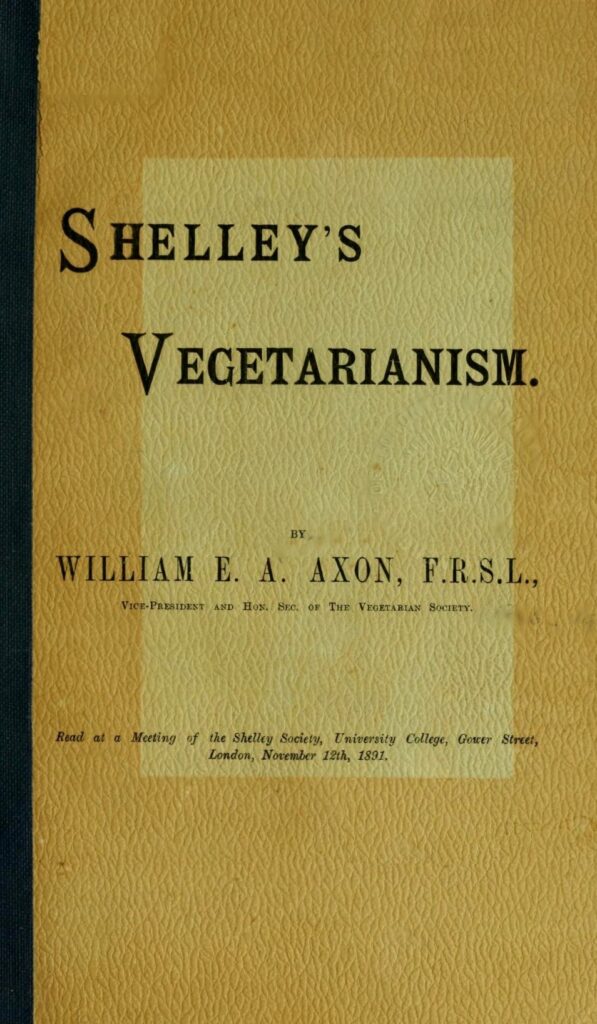A Vegetarian Romantic
Prometheus Unbound:
I wish no living thing to suffer pain.

A Pioneering Vision
Percy Bysshe Shelley is renowned not only for his Romantic poetry and dramatic personal life but also for his advocacy of vegetarianism. His commitment to a plant-based diet was not merely a personal choice but a reflection of his broader ethical, ecological, and economic beliefs.
The Pamphlet: “Shelley’s Vegetarianism”
In 1891, the Vegetarian Society published a pamphlet titled Shelley’s Vegetarianism, which was based on a lecture delivered by William Axon before the Shelley Society in 1890. This pamphlet delves into Shelley’s dietary choices and their significance.

The publication of Shelley’s Vegetarianism was part of the Vegetarian Society’s broader effort to highlight historical figures who championed the cause.
Shelley’s Journey into Vegetarianism
Shelley and his first wife, Harriet Westbrook, adopted a vegetarian diet on March 1, 1812, a year after he was expelled from Oxford for advocating atheism. Influenced by John Frank Newton’s Return to Nature, Shelley later wrote A Vindication of Natural Diet in 1812, which was published in 1813.
Ethical and Social Implications
Shelley saw vegetarianism as more than a dietary preference. He believed that a plant-based diet promoted health, environmental sustainability, and economic justice. He argued that eliminating meat consumption would allow people to make more efficient use of farmland, thereby reducing hunger and inequality.
Inconsistencies and Impulses
Despite his strong convictions, Shelley was not always consistent in his vegetarianism. His friend, Thomas Jefferson Hogg, recounted an incident in which Shelley initially reacted with horror to the sight of bacon but later tried and eagerly consumed it. This episode reflected Shelley’s impulsive nature—he often acted on the spur of the moment without adhering strictly to any set doctrine.
Lasting Influence
Shelley’s advocacy for vegetarianism remains relevant today. His arguments about health, sustainability, and justice continue to resonate with modern vegetarian and vegan movements. His legacy, both literary and dietary, offers a compelling perspective on the intersection of personal ethics and social change.

Your chance to be a poet!
We are running a poetry submission on the theme of Vegetables for World Poetry Day 2025. See how to enter and the guidelines below!
Guidelines for Submission 2025
The Poem
- It must be in English.
- It must be a maximum of 16 lines, plus the title.
- Your poem should contain no swear words, and should be suitable for a mixed audience.
- Your poem should contain no photographs or pictures.
- Your poem should be on the theme of “Vegetables”
Data and Copyright
- Worldwide copyright for the poem will remain with the author but all entrants are deemed to give permission as the author of the submitted poem for the Vegetarian Society to hold, process and display the work on their website, social media accounts and in other media e.g The Pod magazine. You will always be credited alongside your poem, if chosen.
- The Vegetarian Society will have the right to edit and publish the submitted work on its website, social media accounts, and/or in an eBook.
Eligibility and Submission
- The competition is open to members and recipients of our weekly newsletter, and followers on our social media accounts.
- Entry is free but limited to one poem per person.
- Entries must be received by 12 noon on 30 April 2025
- You must submit your entry via Hello@vegsoc.org with the subject Vegetable Poem submission.
- We regret that postal entries cannot be accepted.
- There are no prizes for entries, submissions may be selected to appear in the above media.
Presenting Your Poem
- The poem must be pasted into an email and not as an attachment
- You must include a title to your poem.
- You must provide your name in the email but this detail will not be seen by the selector
- Your name MUST NOT appear IN your poem.
